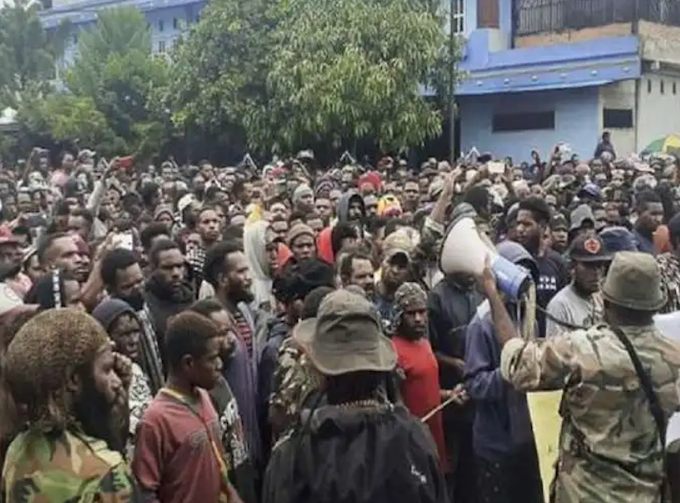
Asia Pacific Report newsdesk
The Pacific Elders’ Voice has expressed deep concern about reports of deteriorating human rights in West Papua and has appealed to Indonesia to allow the proposed UN high commissioner’s visit there before the Bali G20 meeting in November.
A statement from the PEV says the reports suggest an “increased number of extrajudicial executions, enforced disappearances and the internal displacement of Melanesian Papuans”.
The Pacific Elders said that they recalled the Pacific Island Forum Leaders’ Communique made in Tuvalu in 2019 which welcomed an invitation by Indonesia for a mission to West Papua by the UN High Commissioner for Human Rights.
- READ MORE: How colonial puppeteer Indonesia uses ‘autonomy’ to disempower Papuans
- Other human rights violations in West Papua reports

“The communique strongly encouraged both sides to finalise the timing of the visit and for an evidence-based, informed report on the situation be provided before next Pacific Island Forum Leaders meeting in 2020,” the statement said.
“Despite such undertaking, we understand that the Indonesian government has not allowed UN High Commissioner for Human Rights to visit West Papua.
“We find this unacceptable and believe that such behaviour can only exacerbate the tensions in the region.”
The Pacific Elders said Indonesia must “take responsibility for its actions and abuses and make amends for the harm” caused to the Indigenous people of West Papua.
The statement said the elders urgently called for the Indonesian government to allow the UN High Commission for Human Rights to visit West Papua and to prepare a report for the Human Rights Council.
“We call on all members of the Human Rights Council to pass a resolution condemning the current human rights abuses in West Papua,” the statement said.
“We further call on the Human Rights Council to clearly identify the human rights abuses in Indonesia’s Universal Periodic Review and to identify clear steps to rectify the abuses that are taking place.
“We further note that the next G20 Heads of State and Government Summit will take place [on November 15-16] in Bali. We call on all G20 member countries to ensure that a visit by the UN High Commission for Human Rights is allowed to take place before this meeting and that the HCHR is able to prepare a report on her findings for consideration by the G20.
“We believe that no G20 Head of State and Government should attend the meeting without a clear understanding of the human rights situation in West Papua” .
Pacific Elders’ Voice is an independent alliance of Pacific elders whose purpose is to draw on their collective experience and wisdom to provide thought leadership, perspectives, and guidance that strengthens Pacific resilience.
They include former Marshall Islands president Hilde Heine, former Palau president Tommy Remengesau, former Kiribati president Anote Tong, former Tuvalu prime minister Enele Sopoaga, former Pacific Island Forum Secretariat secretary-general Dame Meg Taylor, former Guam University president Robert Underwood, former Fiji ambassador Kaliopate Tavola, and former University of the South Pacific professor Konai Helu Thaman.
‘State terrorism’ over special autonomy
Meanwhile, United Liberation Movement of West Papua (ULMWP) interim president Benny Wenda has detailed “disturbing reports” of increased militarisation and state terrorism in a recent statement about the region.
“Our people have been taking to the streets to show their rejection of Indonesia’s plan to divide us further by the creation of 7 provinces and to demonstrate against the imposition of ‘special autonomy’,” Wenda said.
“Peaceful protestors in Nabire and Jayapura have been met with increasing brutality, with water cannons and tear gas used against them and fully armed police firing indiscriminately at protesters and civilians alike.
“This is state terrorism. Indonesia is trying to use their full military might to impose their will onto West Papuans, to force acceptance of ‘special autonomy’.
The pattern of increased militarisation and state repression over the past few years had been clear, with an alarming escalation in violence, said Wenda.
Last month two protesters were shot dead in Yahukimo Regency for peacefully demonstrating against the expansion of provinces.
“History is repeating itself and we are witnessing a second Act of No Choice. West Papuans are being forced to relive this trauma on a daily basis,” said Wenda.
“The same methods of oppression were used in 1969, with thousands of troops harassing, intimidating and killing any West Papuans who spoke out for independence.”











































